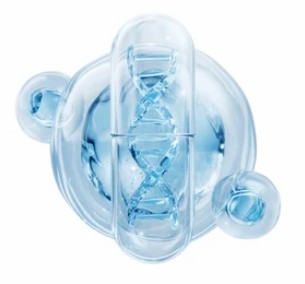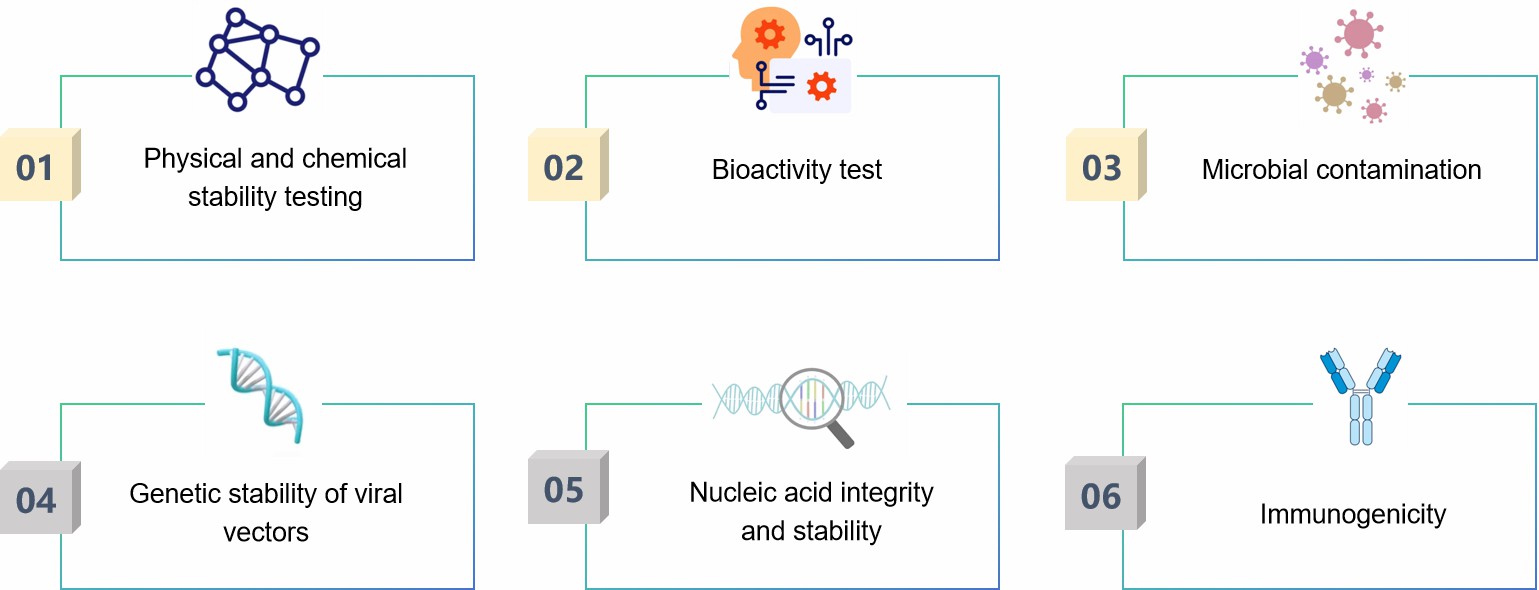Gene Therapy Formulation Long-term Stability Testing
Inquiry
Long-term stability testing of gene therapy formulations refers to the stability study of a formulation under actual storage conditions to determine the product's expiration date and storage conditions to ensure that it remains safe, effective and stable during its expiration date. Therefore, long-term stability testing of gene therapy formulations is of great significance, and this testing is crucial to the development of gene therapy formulations.
CD Formulation provides clients with accurate, reliable and long-term stability testing of gene therapy formulations to help researchers ensure that data on production, storage and transportation conditions are available for gene therapy formulation development, as well as to provide theoretical support for quality standards for gene therapy formulations.
The Importance of Gene Therapy Formulation Long-term Stability Testing
Long-term stability testing can help developers understand the stability characteristics of a product, including sensitive conditions, degradation pathways, and degradation rates, and can also help assess any changes that may occur to a gene therapy formulation during storage, ensuring that the final product always meets quality standards.
- Product improvement and optimization. The results of long-term stability testing can provide a basis for optimizing product formulations and manufacturing processes, helping developers to continually improve product quality.
- Expiration date determination. Long-term stability testing is the basis for establishing a product's expiration date. By evaluating the stability of the product under recommended storage conditions, the safety and efficacy of the product can be ensured during the expiration date.
- Quality control. Long-term stability testing can help developers understand the degradation pathways and rates of degradation of gene therapy formulations and their sensitivity to environmental factors so that appropriate quality control measures can be developed.
- Risk assessment. Long-term stability testing helps to identify and assess potential quality risks, ensuring that problems can be detected and measures taken in a timely manner during production and use.

Explore Our Gene Therapy Formulation Long-term Stability Testing
Physical and chemical stability testing
We do this by assessing whether the formulation will precipitate, aggregate, denature, or undergo other physicochemical changes during storage. Examples include observing changes in color, clarity, precipitates or delamination of the formulation. Evaluate changes in pH during storage for stability, biocompatibility, etc.
Bioactivity test
This process mainly entails testing whether the formulation maintains its intended biological activity and potency during storage. For example, by viral titer or gene load analysis, the expression level of genes in the vector or changes in load are determined. By transduction efficiency assay, to test whether the vector can effectively express the target gene after entering the cell, to assess its loss of activity during storage, etc.
Microbial contamination
To test whether the preparation is contaminated by microorganisms. We mainly perform sterility testing as well as testing for endotoxin levels, which is used to ensure that the preparation remains sterile throughout the storage period.
Genetic stability of viral vectors
For viral vectors, attention is paid to the genetic stability of viral vectors during storage, transportation and use, including changes in viral vector titer, infection titer, aggregation and biological activity.
Nucleic acid integrity and stability
For nucleic acid-based products, we need to assess their integrity and stability during storage, especially for RNA-based products, we need to focus on their sensitivity to RNA enzymes.
Immunogenicity
This process tests whether the formulation will produce protein aggregation or other changes that lead to an immune response during storage and is used to assess whether the formulation will produce unintended immunogenicity during storage.
 Fig.2 Our service for gene therapy formulation long-term stability testing. (CD Formulation)
Fig.2 Our service for gene therapy formulation long-term stability testing. (CD Formulation)
Our Equipment and Instruments for Long-Term Stability Testing
| Equipment and Instruments |
| Next generation sequencing (NGS) |
Quantitative PCR (qPCR) |
Flow cytometry |
| Enzyme-linked immunosorbent assay (ELISA) |
High performance liquid chromatography (HPLC) |
Dynamic light scattering (DLS) and multi-angle light scattering (MALS) |
| Bio-safety cabinets |
Learn more |
Highlights of Our Gene Therapy Formulation Long-term Stability Testing
- Specialized technology and equipment. We are equipped with the latest analytical instruments and equipment to accurately test the physical, chemical and biological activity of gene therapy agents.
- Experienced technical team. We have a multidisciplinary team familiar with the development of gene therapy formulations and can provide comprehensive stability testing solutions, including physicochemical analysis, gene expression assays and immunogenicity assessment.
- Customized solutions. We can provide personalized stability testing services according to the characteristics of different gene vectors and formulations, optimizing the testing solutions to meet the specific needs of our customers.
- Continuous R&D investment. We always focus on the cutting-edge of gene therapy formulation development, continuously optimize testing methods, and innovatively solve the stability challenges of gene therapy formulations.
Published Data
Technology: Gene therapy formulation stability testing
Journal: Pharmaceutics
IF: 5.4
Published: 2024
This study focuses on developing effective nano-carriers for delivering therapeutic miRNA, specifically miR-375, to treat Hepatocellular carcinoma (HCC). Two new cationic nanostructured solid/liquid lipid carriers (NSLCs) were developed and improved to deliver miR-375 into HCC cells. These NSLCs were coated with varying amounts of chitosan (CS). The physical stability, conjugation efficiency, and capacity to shield miR-375 from serum degradation were evaluated for these carriers (F1 and F2). According to the study, both carriers showed low toxicity, sustained long-term stability, and effectively transported miR-375; nevertheless, F2 had better anti-tumor effects when compared to both free miR-375 and doxorubicin (DOX). The findings imply that these NSLCs have demonstrated strong therapeutic efficacy and medication stability.
CD Formulation provides reliable and accurate long-term stability testing services for gene therapy formulations, relying on our advanced technology platform and years of service experience. The testing we provide is essential to ensure the quality and performance of gene therapy formulations throughout their life cycle, and it is of great significance to the formulation's development. If you are interested in us, please feel free to contact us.
References
- Soliman B, et al. Preparation and Optimization of MiR-375 Nano-Vector Using Two Novel Chitosan-Coated Nano-Structured Lipid Carriers as Gene Therapy for Hepatocellular Carcinoma. Pharmaceutics. 2024, 16(4):494.
Related Services


 Fig.2 Our service for gene therapy formulation long-term stability testing. (CD Formulation)
Fig.2 Our service for gene therapy formulation long-term stability testing. (CD Formulation)